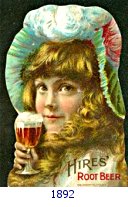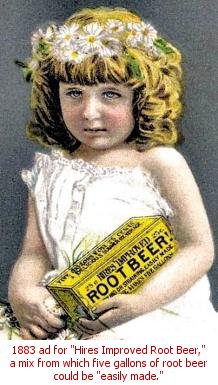 But what of its claim that
Hires Root Beer is “more than 120 years old”—that is, that it dates back to
some time earlier than 1885?
But what of its claim that
Hires Root Beer is “more than 120 years old”—that is, that it dates back to
some time earlier than 1885?
Thursday, November 10, 2005
Page 15
REMINISCING (Column)
Does Hires Root Beer Date Back 120 Years?
By ROGER M. GRACE
“Hires Root Beer, America’s original root beer, is more than 120 years old and the oldest continuously marketed soft drink in the United States.”
That’s how last week’s column started, with that quote from the Dr Pepper/7-up website. No, this is not a rerun.
At our last get-together, I sought to show that Hires is not “America’s original root beer.” To the contrary, root beer had been consumed, sub nom. “short beer,” in colonial days, and was re-dubbed “root beer” long before pharmacist Charles E. Hires served it at his drug store in Philadelphia.
Yet, Dr Pepper/7-up’s owner, Cadbury/Schweppes, the third largest soft drink maker in the world (and largest maker of “uncolas”), blithely spews the untruth that Hires is “America’s original root beer.”
 But what of its claim that
Hires Root Beer is “more than 120 years old”—that is, that it dates back to
some time earlier than 1885?
But what of its claim that
Hires Root Beer is “more than 120 years old”—that is, that it dates back to
some time earlier than 1885?
It’s true—or not—depending on how you define “Hires Root Beer.”
Probably to most of us, the words “Hires Root Beer” signify a brand of a ready-to-drink, carbonated, root-based soft drink, available in bottles or cans. Such a product was not on the market in 1885.
There were, indeed, carbonated soft drinks (or “pop”) in bottles then. But Hires Root Beer wasn’t among them. (Soft drinks didn’t come in cans until 1938 when Cliquot Club Ginger Ale first appeared in tin containers.)
Most sources list 1893 as the date when bottled Hires Root Beer went on the market. According to a 1932 United States Board of Tax Appeals decision, it was in 1895 that the Charles E. Hires Company “added to its former products carbonated root beer put up in bottles ready for consumption.” Whichever date is right, it was later than 1885.
Those
“former products,” according to the decision, were “Hires’ Improved Root-Beer
Package,” inaugurated in 187 7, which was “a dry preparation known as from
which root beer was obtained by a simple process,” and “Hires’ Root-Beer
Extract,” introduced he following year, “from which, by the addition of water
and yeast, root beer was easily made, ready for consumption.” Neither product
constituted a “root beer”—they were the makings for root beer.
7, which was “a dry preparation known as from
which root beer was obtained by a simple process,” and “Hires’ Root-Beer
Extract,” introduced he following year, “from which, by the addition of water
and yeast, root beer was easily made, ready for consumption.” Neither product
constituted a “root beer”—they were the makings for root beer.
So, the only way Hires Root Beer could be said to date back more than 120 years is if you take into account the glasses of root beer Charles Hires sold to customers at his drug store.
Just when it was that he started making those sales is not known. Various websites blindly parrot the phrase “Hires Root Beer was created by pharmacist Charles Elmer Hires on May 16, 1866,” but no documentation is provided. Given that Hires was born Aug. 19, 1851, that would mean he was 14. The 1866 date is rendered all the more doubtful in light of the lore that his recipe for root beer was based on one for an herbal tea which he secured from an innkeeper in New Jersey while he was on his honeymoon.
That “honeymoon” tale appears on the Cadbury Schweppes website and was embraced by the previous owner of Hires, Crush International, Inc. There are, however, other versions of how Hires Root Beer came to be. As the obituary of Hires dispatched by the Associated Press on July 12, 1937 told it:
“Hires was a young medical student at the Jefferson medical college when a friend, Dr. Russell Conwell, founder of the Temple university, asked him to assist in concocting a beverage for sale to Pennsylvania miners in the intrerest of a temperance movement. With two other professors, they made the drink out of root, bark, and berry ingredients.”
It’s been speculated that the serving of the soft drink at Hires’ drug store stemmed from carbonated water at the soda fountain being added to Hires’ herb tea. This is unlikely, implying as it does the chance discovery of something new, while root beer was by then a common beverage.
Is Hires Root Beer the “oldest continuously marketed soft drink in the United States”?
That’s next week’s topic.
Copyright 2005, Metropolitan News Company